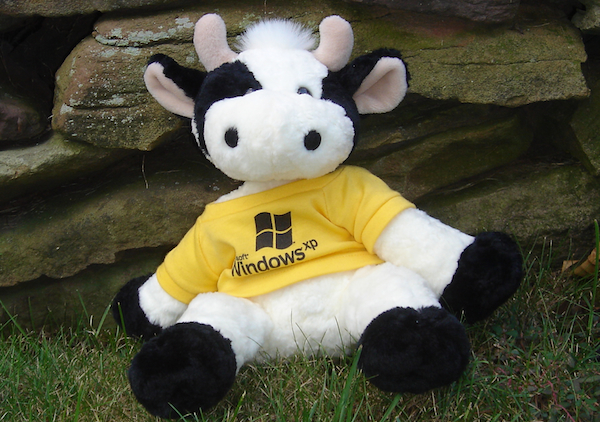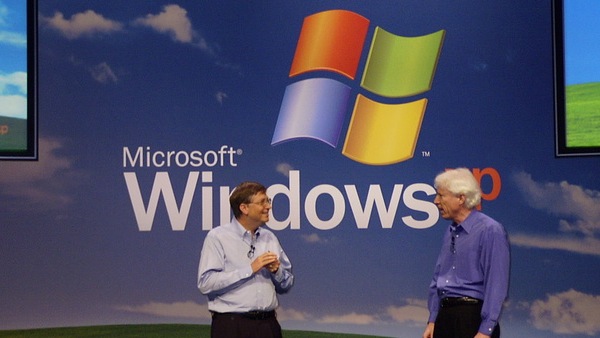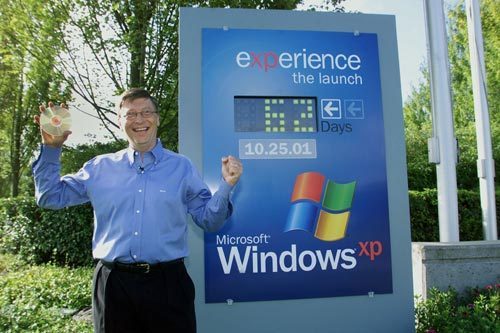
Where did Windows XP codename 'Whistler' come from?
Fifth in a series. We continue our series about Windows XP's release to manufacturing 10th anniversary with a quick look at codenames for this product and others around it.
This picture is me, sitting in the terrace of the Long-Horn Saloon in Whistler, British Columbia. The photo is also the Windows roadmap. On the right side of the terrace, the slopes are coming down from Whistler Mountain (Whistler = codename for Windows XP).

Windows XP was two products worth of development
Fourth in a series. I remember something from the Windows XP rollout in New York City. At the Marriott Marquis in Times Square, Gateway gave out these. Mo-o-o-o-o.
I recall that it was common to criticize XP early on as being a minor update to Windows 2000, as in Windows 2000.1. There may have been something to that, but the operating system developed into much more.

You can pry Windows XP from my cold, dead hands
Third in a series. As a long-time programmer, I was still using Windows 95 when I finally purchased my mainstay computer that came with Windows XP. I am not the type to use the leading edge computers or software. The software I write (programming tools for programmers) was designed to run on minimal hardware, so I preferred to stay with an operating system much longer than most programmers would. Programmers are notorious for wanting the leading-edge computers, but not me.
My Windows 95 PC was starting to get a bit obsolete and it was time to switch to the latest operating system, so I purchased a new computer with Windows XP Home on it. The computer was an eMachine T2542, with a 2.5GHz Celeron CPU, 256 meg RAM and a 40 gig hard drive.

What Windows XP's Launch Meant to Me
Second in a series. I remember my Windows XP experiences like it was just yesterday. I became aware of Windows XP when it was called Whistler back in 2000. There was a technology television show on ZD-TV called "The Screen Savers" with host Leo Laporte and Patrick Norton. During many call-ins, persons would ask, should I upgrade from Windows 98 to ME or 2000. Leo would often suggest that users shouldn't bother since Whistler would be coming out next year.
I wondered what this Whistler was about, so I decided to do some web searching about it and came across Paul Thurrott's Supersite for Windows. I started following his chronicles with the early betas from early development phases into what became Windows XP with the well-known Luna theme around beta 2.

Remembering Windows XP
First in a series. It was an innocent time. There was fun, fanfare and pride. Thousands of people worked together to complete something that would affect billions of lives -- that would be the most successful product of its kind. Ever. Eighteen days later the world they knew changed.
Ten years ago today, Aug. 24, 2001, in Redmond Washington, Microsoft Chairman Bill Gates and Jim Allchin, then vice president of the platforms group, officially released to manufacturing Windows XP. The RTM marked a huge achievement for Microsoft, which finally had a consumer operating system based on the NT kernel. Windows XP marked the end of the DOS/Windows 9x legacy and the beginning of a new lineage of Microsoft operating systems, continuing the path paved by Windows 2000 some 18 months earlier.

Payments and the disappearing cash register: Your phone is your wallet
Betanews is taking an extended look at how mobile and wireless technology are affecting retail and the exchange of money between consumers and businesses. We'll be examining such trends as the shift to digital payment systems, near field communications (NFC), new concepts in retail cash registers, as well as Point of Sale software and retail data management and security. All of these factors will contribute to the eventual obsolescence of the old-fashioned cash till.
For more than six years, Visa has offered a contactless, NFC-based (near field communications) payment system in select North American markets. This Fall, as a part of its new Digital Wallet initiative, this contactless payment system will be available to customers across the United States.

Firefox 3.5 vs. Chrome 3 Showdown, Round 3: Finding a place for more tabs
Download Google Chrome for Windows Beta 3.0.191.3 from Fileforum now.
With Web pages having evolved into Web sites and moving on to become Web applications, we find ourselves frequently revisiting the question of what a Web browser tab should represent. In researching a topic for multiple stories during the course of a day, I often find myself with as many as a hundred tabs open at one time. And yes, I try to keep them in some kind of order, which is never easy; and when the browser crashes (as it still often does), recovering all those open tabs is becoming more difficult, it seems, as time goes on.

Firefox 3.5 vs. Chrome 3 Showdown, Round 2: Are bookmarks outmoded?
Download Firefox 3.5 Final for Windows from Fileforum now.
It's a trend we're noticing more and more with folks who use Web browsers: Google Search is becoming so ubiquitous that people are comfortable with typing a query rather than referencing a bookmark, to relocate a page they remember. It saves them the trouble of having to save the page in the first place. You think I'm kidding? Two of the search phrases that land Google users on Betanews most often are "beta news" and "Betanews."

Firefox 3.5 vs. Chrome 3 Showdown, Round 1: How private is private browsing?
This is the week that the Mozilla organization is expected to unveil what may very well be the most significant half-point release in its history: the 3.5 edition of the Firefox browser. While Betanews tests confirm the new version literally blows away its own predecessor in terms of speed, operating two-and-one-half times faster in page rendering and functionality on average, your own eyes will tell you it's a much faster browser.
And those same eyes will tell you that Google Chrome is already a much faster browser, by virtue of a supremely fast V8 JavaScript engine that its developers have been refining since version 1 made its debut last year. In recent Betanews tests, the Chrome 3 beta has overtaken the stable release of Apple Safari 4 as the fastest Web browser publicly available, posting a performance index score that's 83% faster than Firefox 3.5 RC3 on Windows XP SP3. So while Firefox has made extremely significant gains, it may take open source developers until version 4.0 for it to catch up with Chrome in the speed department.

Bing vs. Google rematch after Microsoft upgrades explicit filtering
A few weeks ago, in our ongoing series of duels between the reigning champion search engine Google and the contender "decision engine" Bing, we gave Bing the edge in a battle of the image filters: With both search engines' explicit image filtering turned on, we were able to explore a very sensitive topic -- breast cancer -- and have Bing yield sensible and respectful, but sometimes graphic, images without presenting offensive content.
Since that time, as we reported last week, Microsoft has implemented a very practical concept for helping individuals and businesses to ensure filtering takes place -- this after complaints were raised about how ridiculously simple it is for any user to turn filtering off in both Bing and Google. As Bing General Manager Mike Nichols announced on Friday, the thumbnails of images which Bing deems to be of a sensitive nature will be sent through a specific URL, explicit.bing.net. That way, users can take extra steps to filter questionable content.

Top 10 Windows 7 features #1: Action Center
It's a sad fact which even Microsoft itself has stopped denying: The success of Windows in recent years has been despite the fact that the operating system isn't exactly embraced by its users. The percentage of Windows users who love Windows may not come anywhere near the percentage of Mac OS users who love Macintosh. Windows is what comes on most people's PCs.
In the past few months, Microsoft's marketing campaign has cleverly (and finally) diverted attention away from Vista, which on a public relations scale has largely failed to win the public's affection. Instead, you'll notice that the selling point of Windows recently is that it enables you to buy a bigger and better PC. Spend $1,500 or less and you're going to get twice the memory, twice the storage, and much better graphics. The word "Vista" doesn't even appear in the company's advertising. It's an effective argument -- what's more, it's accurate, and it's the strongest argument in Microsoft's favor.

Bing vs. Google face-off, round 5
After last week's scuffle with filtered image results, we left our two major Web search engines in a tie-up, with the score Bing 3, Google 3 after six heats. For the tie breaker for this week, we're going to throw a curve ball.
A great search engine has to be responsive and helpful and informative for someone who is completely in the dark, not only about the topic he's interested in, but about the nature of the Internet. Some of our comments this week have taken us to task for not using the smartest queries -- for instance, one person asked, why couldn't someone have searched on IMDB.com for Rod Taylor instead of on Google or Bing? The answer there is, IMDB may be no better than either Bing or Google at helping someone locate an actor based on minimal information. We created a "backwards" query for this test because that's the type of query inquisitive folks may very well create for themselves.

Bing vs. Google face-off, round 4
The big problem which massive multimedia online indexes face today, which may only get worse before it can ever get better, is with their capability to shield certain viewers from content they do not want appearing on their computer. Regardless of the entire debate over whether the Internet should have content regulation, individuals should have the right not to see what they do not wish to see, and they should also have the right to prevent their children from seeing it as well. It may be everybody's Internet, but in the end, it's my computer and it's your computer.
Since we started our Face-off series with Google and Bing just last Monday, we've gotten a lot of very positive comments and accolades from readers (thank you so much), plus we've received suggestions that we pit the two search engines together to see which one is the most capable of filtering out the junk. What do you not want to see on your computer, and what things about you personally do you not want others to see on their computers -- and which search engine cares the most about answering those questions?

Bing vs. Google face-off, round 3
Download Microsoft Bing Maps 3D 4.0 from Fileforum now.
If you've ever used any of the major travel sites like Travelocity or Priceline to plan a business trip, you may have already encountered what I consider to be their principal deficiency thus far: They don't make hotel suggestions based on the hard, raw data about what amenities are in the general vicinity, and what travelers want to see or to have close at hand.

Bing vs. Google face-off, round 2
The way we left things yesterday, we gave Microsoft's newly revamped Bing search engine some moderately tough, everyday search tests, and gave Google the same treatment. After three heats, the score thus far is Bing 2, Google 1, with Bing performing quite admirably in the computer parts shopping department.
Search engines are fairly good for finding something you know you're searching for. In the real world, folks don't often know what or who it is they're searching for, which is why they're searching for him. So suppose someone sends you out on the Internet to find...
